COVID-19 'Pandemic'
- Thread starter Ocean Breeze
- Start date
You are using an out of date browser. It may not display this or other websites correctly.
You should upgrade or use an alternative browser.
You should upgrade or use an alternative browser.
I thought they tested your load to make sure the vasectomy ain't leaking.
They test for various crap..
They take samples away for testing.. or the local BBQ
Last edited:
As one retired California nurse asked of the San Diego County Board of Supervisors, "Why do the protected need to be protected from the unprotected by forcing the unprotected to use the protection that didn't protect the protected in the first place?"
Good Question.
Good Question.
Pfizer files for U.S. authorization of COVID-19 antiviral pill
Author of the article:Reuters
Reuters
Michael Erman
Publishing date:Nov 16, 2021 • 4 hours ago • 2 minute read • Join the conversation
Paxlovid, a Pfizer's coronavirus disease pill, is seen manufactured in Ascoli, Italy, in this undated handout photo obtained by Reuters on Nov. 16, 2021.
Paxlovid, a Pfizer's coronavirus disease pill, is seen manufactured in Ascoli, Italy, in this undated handout photo obtained by Reuters on Nov. 16, 2021. PHOTO BY PFIZER /Handout via REUTERS
Article content
Pfizer Inc said on Tuesday it is seeking U.S. authorization of its experimental antiviral COVID-19 pill that cut the chance of hospitalization or death for adults at risk of severe disease by 89% in a clinical trial.
Advertisement
STORY CONTINUES BELOW
Article content
Pfizer said it completed submission of its application for emergency use authorization (EUA) of the drug, Paxlovid, with the U.S. Food and Drug Administration, including data from the drugmaker’s clinical trial.
The oral drug could be a promising new weapon in the fight against the pandemic, as it can be taken as an early at-home treatment to help prevent COVID-19 hospitalizations and deaths. It could also become a important tool in countries and areas with limited access to vaccines or low vaccination rates.
It is not immediately clear when U.S. regulators will rule on Pfizer’s application. Merck & Co and Ridgeback Biotherapeutics, which are developing a competing pill, molnupiravir, completed their EUA submission on Oct. 11.
Advertisement
STORY CONTINUES BELOW
Article content
A panel of outside advisers to the FDA will meet to consider that application on Nov. 30. It is expected to be available this year.
“We are moving as quickly as possible in our effort to get this potential treatment into the hands of patients, and we look forward to working with the U.S. FDA on its review of our application, along with other regulatory agencies around the world,” Pfizer Chief Executive Albert Bourla said in a news release.
A Pfizer spokesperson said that the data the company is submitting came from testing the medicine on unvaccinated, high-risk participants. The FDA will make the final decision on who the drug will be indicated for and how it can be used.
The New York-based drugmaker said it has begun the process of seeking authorization of the treatment in several countries including the United Kingdom, Australia, New Zealand and South Korea, and plans further international submissions.
Pfizer has said it expects to manufacture 180,000 treatment courses by the end of next month and at least 50 million courses by the end of 2022.
The company earlier on Tuesday said it will allow generic manufacturers to supply its COVID-19 pill to 95 low- and middle-income countries through a licensing agreement with international public health group Medicines Patent Pool (MPP).
 torontosun.com
torontosun.com
Author of the article:Reuters
Reuters
Michael Erman
Publishing date:Nov 16, 2021 • 4 hours ago • 2 minute read • Join the conversation
Paxlovid, a Pfizer's coronavirus disease pill, is seen manufactured in Ascoli, Italy, in this undated handout photo obtained by Reuters on Nov. 16, 2021.
Paxlovid, a Pfizer's coronavirus disease pill, is seen manufactured in Ascoli, Italy, in this undated handout photo obtained by Reuters on Nov. 16, 2021. PHOTO BY PFIZER /Handout via REUTERS
Article content
Pfizer Inc said on Tuesday it is seeking U.S. authorization of its experimental antiviral COVID-19 pill that cut the chance of hospitalization or death for adults at risk of severe disease by 89% in a clinical trial.
Advertisement
STORY CONTINUES BELOW
Article content
Pfizer said it completed submission of its application for emergency use authorization (EUA) of the drug, Paxlovid, with the U.S. Food and Drug Administration, including data from the drugmaker’s clinical trial.
The oral drug could be a promising new weapon in the fight against the pandemic, as it can be taken as an early at-home treatment to help prevent COVID-19 hospitalizations and deaths. It could also become a important tool in countries and areas with limited access to vaccines or low vaccination rates.
It is not immediately clear when U.S. regulators will rule on Pfizer’s application. Merck & Co and Ridgeback Biotherapeutics, which are developing a competing pill, molnupiravir, completed their EUA submission on Oct. 11.
Advertisement
STORY CONTINUES BELOW
Article content
A panel of outside advisers to the FDA will meet to consider that application on Nov. 30. It is expected to be available this year.
“We are moving as quickly as possible in our effort to get this potential treatment into the hands of patients, and we look forward to working with the U.S. FDA on its review of our application, along with other regulatory agencies around the world,” Pfizer Chief Executive Albert Bourla said in a news release.
A Pfizer spokesperson said that the data the company is submitting came from testing the medicine on unvaccinated, high-risk participants. The FDA will make the final decision on who the drug will be indicated for and how it can be used.
The New York-based drugmaker said it has begun the process of seeking authorization of the treatment in several countries including the United Kingdom, Australia, New Zealand and South Korea, and plans further international submissions.
Pfizer has said it expects to manufacture 180,000 treatment courses by the end of next month and at least 50 million courses by the end of 2022.
The company earlier on Tuesday said it will allow generic manufacturers to supply its COVID-19 pill to 95 low- and middle-income countries through a licensing agreement with international public health group Medicines Patent Pool (MPP).

Pfizer files for U.S. authorization of COVID-19 antiviral pill
Pfizer Inc said on Tuesday it is seeking U.S. authorization of its experimental antiviral COVID-19 pill that cut the chance of hospitalization or death for adults a…
Pfizer to allow generic versions of its COVID pill in 95 countries
Author of the article:Reuters
Reuters
Michael Erman and Emma Farge
Publishing date:Nov 16, 2021 • 19 hours ago • 3 minute read • Join the conversation
A 3D printed Pfizer logo is placed near medicines from the same manufacturer in this illustration taken Sept. 29, 2021.
A 3D printed Pfizer logo is placed near medicines from the same manufacturer in this illustration taken Sept. 29, 2021. PHOTO BY DADO RUVIC /REUTERS
Article content
Pfizer Inc said on Tuesday it will allow generic manufacturers to supply its experimental antiviral COVID-19 pill to 95 low- and middle-income countries through a licensing agreement with international public health group Medicines Patent Pool (MPP).
Advertisement
STORY CONTINUES BELOW
Article content
The voluntary licensing agreement between Pfizer and the MPP will allow the UN-backed group to grant sub-licences to qualified generic drug manufacturers to make their own versions of PF-07321332. Pfizer will sell the pills it manufactures under the brand name Paxlovid.
Medical charity Medecins Sans Frontieres said it was “disheartened” by the deal which it said was restrictive and excluded countries such as Argentina and China with established capacity for producing generic drugs.
“The world knows by now that access to COVID-19 medical tools needs to be guaranteed for everyone, everywhere, if we really want to control this pandemic,” said Yuanqiong Hu, MSF Senior Legal Policy Adviser.
Pfizer, which also makes one of the mostly widely used COVID-19 vaccines, has said the pill cut the chance of hospitalization or death for adults at risk of severe disease by 89% in its clinical trial. The drug will be used in combination with ritonavir, an HIV drug that is already available generically.
Advertisement
STORY CONTINUES BELOW
Article content
Pfizer’s licensing deal follows a similar arrangement by rival Merck & Co for generic manufacturing of its COVID-19 treatment. The deals are unusual arrangements that acknowledge the dire need for effective treatments as well as the pressure drugmakers are under to make their life-saving drugs accessible at very low costs.
“We are extremely pleased to have another weapon in our armoury to protect people from the ravages of COVID-19,” Charles Gore, Executive Director of the Medicines Patent Pool, said in an interview.
Gore said he hoped the generic version of Pfizer’s drug would be available within months.
The 95 countries in the agreement cover around 53% of the world’s population and include all low- and lower-middle-income countries and some upper-middle-income countries in Sub-Saharan Africa. They also include countries that have transitioned from lower-middle to upper-middle-income status in the past five years, Pfizer and the MPP said.
Advertisement
STORY CONTINUES BELOW
Article content
“We must work to ensure that all people – regardless of where they live or their circumstances – have access to these breakthroughs,” Pfizer Chief Executive Albert Bourla said in a statement.
Pfizer will waive royalties on sales in low-income countries. It will also waive them in the other countries covered by the agreement as long as COVID-19 remains classified as a public health emergency of international concern by the World Health Organization.
Pfizer’s version of the drug will be in high demand. The company has said it expects to manufacture 180,000 treatment courses by the end of next month and at least 50 million courses by the end of 2022.
Even so, the drugmaker could be stretched trying to supply 47% of the world’s population. A Pfizer executive said last week the market for the drug might be up to 150 million people and that many countries might also be interested in buying doses for their strategic reserves.
Pfizer has said it will sell the supply it produces using a tiered pricing approach based on the income level of each country. In the United States, it expects to price its treatment close to where Merck has priced its drug at around $700 a course.
Merck has licence agreements for it COVID-19 pill, molnupiravir, in over 100 countries. Still, some international health officials said even that is not enough for the medicine to reach many in low- and middle-income countries in large enough numbers.
 torontosun.com
torontosun.com
Author of the article:Reuters
Reuters
Michael Erman and Emma Farge
Publishing date:Nov 16, 2021 • 19 hours ago • 3 minute read • Join the conversation
A 3D printed Pfizer logo is placed near medicines from the same manufacturer in this illustration taken Sept. 29, 2021.
A 3D printed Pfizer logo is placed near medicines from the same manufacturer in this illustration taken Sept. 29, 2021. PHOTO BY DADO RUVIC /REUTERS
Article content
Pfizer Inc said on Tuesday it will allow generic manufacturers to supply its experimental antiviral COVID-19 pill to 95 low- and middle-income countries through a licensing agreement with international public health group Medicines Patent Pool (MPP).
Advertisement
STORY CONTINUES BELOW
Article content
The voluntary licensing agreement between Pfizer and the MPP will allow the UN-backed group to grant sub-licences to qualified generic drug manufacturers to make their own versions of PF-07321332. Pfizer will sell the pills it manufactures under the brand name Paxlovid.
Medical charity Medecins Sans Frontieres said it was “disheartened” by the deal which it said was restrictive and excluded countries such as Argentina and China with established capacity for producing generic drugs.
“The world knows by now that access to COVID-19 medical tools needs to be guaranteed for everyone, everywhere, if we really want to control this pandemic,” said Yuanqiong Hu, MSF Senior Legal Policy Adviser.
Pfizer, which also makes one of the mostly widely used COVID-19 vaccines, has said the pill cut the chance of hospitalization or death for adults at risk of severe disease by 89% in its clinical trial. The drug will be used in combination with ritonavir, an HIV drug that is already available generically.
Advertisement
STORY CONTINUES BELOW
Article content
Pfizer’s licensing deal follows a similar arrangement by rival Merck & Co for generic manufacturing of its COVID-19 treatment. The deals are unusual arrangements that acknowledge the dire need for effective treatments as well as the pressure drugmakers are under to make their life-saving drugs accessible at very low costs.
“We are extremely pleased to have another weapon in our armoury to protect people from the ravages of COVID-19,” Charles Gore, Executive Director of the Medicines Patent Pool, said in an interview.
Gore said he hoped the generic version of Pfizer’s drug would be available within months.
The 95 countries in the agreement cover around 53% of the world’s population and include all low- and lower-middle-income countries and some upper-middle-income countries in Sub-Saharan Africa. They also include countries that have transitioned from lower-middle to upper-middle-income status in the past five years, Pfizer and the MPP said.
Advertisement
STORY CONTINUES BELOW
Article content
“We must work to ensure that all people – regardless of where they live or their circumstances – have access to these breakthroughs,” Pfizer Chief Executive Albert Bourla said in a statement.
Pfizer will waive royalties on sales in low-income countries. It will also waive them in the other countries covered by the agreement as long as COVID-19 remains classified as a public health emergency of international concern by the World Health Organization.
Pfizer’s version of the drug will be in high demand. The company has said it expects to manufacture 180,000 treatment courses by the end of next month and at least 50 million courses by the end of 2022.
Even so, the drugmaker could be stretched trying to supply 47% of the world’s population. A Pfizer executive said last week the market for the drug might be up to 150 million people and that many countries might also be interested in buying doses for their strategic reserves.
Pfizer has said it will sell the supply it produces using a tiered pricing approach based on the income level of each country. In the United States, it expects to price its treatment close to where Merck has priced its drug at around $700 a course.
Merck has licence agreements for it COVID-19 pill, molnupiravir, in over 100 countries. Still, some international health officials said even that is not enough for the medicine to reach many in low- and middle-income countries in large enough numbers.

Pfizer to allow generic versions of its COVID pill in 95 countries
Pfizer Inc said on Tuesday it will allow generic manufacturers to supply its experimental antiviral COVID-19 pill to 95 low- and middle-income countries through a l…
Canada has thrown away at least one million COVID-19 vaccine doses: survey
Author of the article:Canadian Press
Canadian Press
Mickey Djuric and Laura Osman
Publishing date:Nov 19, 2021 • 12 hours ago • 4 minute read • 13 Comments
Vials with Pfizer-BioNTech and Moderna coronavirus disease (COVID-19) vaccine labels are seen in this illustration picture taken March 19, 2021.
Vials with Pfizer-BioNTech and Moderna coronavirus disease (COVID-19) vaccine labels are seen in this illustration picture taken March 19, 2021. PHOTO BY DADO RUVIC /REUTERS
Article content
An informal survey shows that at least one million doses of Canada’s COVID-19 vaccine supply have gone to waste.
Advertisement
STORY CONTINUES BELOW
Article content
The Canadian Press asked health ministries across the country to provide the number of doses that had to be disposed of because they had expired or for other reasons.
Not all were able to reply by deadline. Some jurisdictions — including Yukon, Northwest Territories, and Prince Edward Island — only provided the number of expired doses. Ontario refused to provide any information.
The survey suggests at least 1,016,669 doses have been rejected since vaccines first arrived last December. That’s about 2.6% of the entire supply delivered to the provinces and territories that provided their numbers.
Unused doses vary wildly across Canada. Alberta reported disposing of 10% of its doses; Nova Scotia 0.3%.
Some waste is to be expected, but Canada should be striving for the lowest amount possible, said Dr. Ross Upshur of Toronto’s Dalla Lana School of Public Health and co-chair of the World Health Organization’s COVID-19 ethics working group.
Advertisement
STORY CONTINUES BELOW
Article content
It’s difficult to know if Canada is meeting that goal because of poor data-sharing and a lack of transparency, said Upshur.
“Some of that wastage might be from breaches of cold chain (some vaccines must be kept at low temperatures), but some could be not getting them into arms before the vaccine expires. It’s a complex, complex, complex issue,” Upshur said.
Provinces gave various reasons for wasted doses. They included dropped vials or syringes, defective syringes or damaged vials, poor dose managementand expired doses. Many could not provide a full breakdown.
Without complete data it’s hard to know whether Canada’s vaccine supply is being managed effectively, said Upshur. For example, onlysome provinces could provide the number of doses that expired.
Advertisement
STORY CONTINUES BELOW
Article content
In those provinces and territories, about 0.45% of their vaccines had to be tossed because of an expiry date — about 120,578 doses.
“From a basic ethics principle, you want to be efficient — waste not want not,” said Upshur. “But also we know from decades and decades of vaccine program delivery that wastage is a reality.
“A million doses sounds like a lot ⦠but then you have to ask the questions of what were the factors when you break down (what) led to the wastage of the vaccines.”
Provinces report information about wasted doses to the COVID-19 Immunization National Operations Centre, but the Public Health Agency of Canada would not release the information.
When asked whether Canada has set thresholds for maximum COVID-19 waste, a spokesperson for PHAC said it works closely with provinces and territories to minimize wastage.
Advertisement
STORY CONTINUES BELOW
Article content
“Over the course of the rollout, provinces and territories have taken great care to minimize wastage,” the agency wrote in a statement Friday.
“However, as the proportion of eligible Canadians vaccinated continues to increase and demand goes down, it is possible that some increased wastage will be observed due to multi-dose vial presentations, fewer opportunities for use, and limited shelf life of the product once punctured.”
A spokesperson for Nunavut’s Department of Health explained that with smaller populations in some communities there are sometimes doses left over in vials that can’t be saved.
Alberta’s Ministry of Health said wastage has become unavoidable because fewer people are coming in for shots.
Advertisement
STORY CONTINUES BELOW
Article content
As provinces begin rolling out their booster programs to fend off new waves of COVID-19, vaccine eligibility could lead to more waste, said Dr. Leyla Asadi, an Edmonton-based infectious diseases doctor.
“If doses are being discarded because of a lack of eligibility or strict criteria, then that’s inappropriate, because we know globally there is a gross shortage of vaccines. Any dose wasted is really quite sad,” Asadi said.
Alberta continues to have hundreds of thousands of doses stockpiled, she said, yet pharmacists she’s spoken to say they’ve been told to discard doses rather than give boosters to non-eligible people. Asadi said provinces can prevent waste by offering booster shots to anyone 18 or older, similarly to what Manitoba has done.
Advertisement
STORY CONTINUES BELOW
Article content
“It’s a bizarre situation we are in, because there are people in Alberta and other provinces who want that third dose.”
Adam Houston, who works on medical policy for Medecins Sans Frontieres (Doctors Without Borders) said Canada’s vaccine waste is concerning when 47% of the world’s eligible population — the majority in sub-Saharan Africa — has yet to receive a first dose.
Canada has a stockpile of 6.5 million doses and has donated 6.4 million doses to COVAX, an organization working to provide COVID-19 vaccines to low- and middle-income countries.
“A dose sitting in a freezer somewhere not going into anybody’s arm and ticking towards expiry, that’s not something we want to see at all,” Houston said. “An expired dose is the worst scenario in a pandemic where many people don’t have access to a first dose.
“That certainly suggests Canada could be doing more in this regard.”

 torontosun.com
torontosun.com
Author of the article:Canadian Press
Canadian Press
Mickey Djuric and Laura Osman
Publishing date:Nov 19, 2021 • 12 hours ago • 4 minute read • 13 Comments
Vials with Pfizer-BioNTech and Moderna coronavirus disease (COVID-19) vaccine labels are seen in this illustration picture taken March 19, 2021.
Vials with Pfizer-BioNTech and Moderna coronavirus disease (COVID-19) vaccine labels are seen in this illustration picture taken March 19, 2021. PHOTO BY DADO RUVIC /REUTERS
Article content
An informal survey shows that at least one million doses of Canada’s COVID-19 vaccine supply have gone to waste.
Advertisement
STORY CONTINUES BELOW
Article content
The Canadian Press asked health ministries across the country to provide the number of doses that had to be disposed of because they had expired or for other reasons.
Not all were able to reply by deadline. Some jurisdictions — including Yukon, Northwest Territories, and Prince Edward Island — only provided the number of expired doses. Ontario refused to provide any information.
The survey suggests at least 1,016,669 doses have been rejected since vaccines first arrived last December. That’s about 2.6% of the entire supply delivered to the provinces and territories that provided their numbers.
Unused doses vary wildly across Canada. Alberta reported disposing of 10% of its doses; Nova Scotia 0.3%.
Some waste is to be expected, but Canada should be striving for the lowest amount possible, said Dr. Ross Upshur of Toronto’s Dalla Lana School of Public Health and co-chair of the World Health Organization’s COVID-19 ethics working group.
Advertisement
STORY CONTINUES BELOW
Article content
It’s difficult to know if Canada is meeting that goal because of poor data-sharing and a lack of transparency, said Upshur.
“Some of that wastage might be from breaches of cold chain (some vaccines must be kept at low temperatures), but some could be not getting them into arms before the vaccine expires. It’s a complex, complex, complex issue,” Upshur said.
Provinces gave various reasons for wasted doses. They included dropped vials or syringes, defective syringes or damaged vials, poor dose managementand expired doses. Many could not provide a full breakdown.
Without complete data it’s hard to know whether Canada’s vaccine supply is being managed effectively, said Upshur. For example, onlysome provinces could provide the number of doses that expired.
Advertisement
STORY CONTINUES BELOW
Article content
In those provinces and territories, about 0.45% of their vaccines had to be tossed because of an expiry date — about 120,578 doses.
“From a basic ethics principle, you want to be efficient — waste not want not,” said Upshur. “But also we know from decades and decades of vaccine program delivery that wastage is a reality.
“A million doses sounds like a lot ⦠but then you have to ask the questions of what were the factors when you break down (what) led to the wastage of the vaccines.”
Provinces report information about wasted doses to the COVID-19 Immunization National Operations Centre, but the Public Health Agency of Canada would not release the information.
When asked whether Canada has set thresholds for maximum COVID-19 waste, a spokesperson for PHAC said it works closely with provinces and territories to minimize wastage.
Advertisement
STORY CONTINUES BELOW
Article content
“Over the course of the rollout, provinces and territories have taken great care to minimize wastage,” the agency wrote in a statement Friday.
“However, as the proportion of eligible Canadians vaccinated continues to increase and demand goes down, it is possible that some increased wastage will be observed due to multi-dose vial presentations, fewer opportunities for use, and limited shelf life of the product once punctured.”
A spokesperson for Nunavut’s Department of Health explained that with smaller populations in some communities there are sometimes doses left over in vials that can’t be saved.
Alberta’s Ministry of Health said wastage has become unavoidable because fewer people are coming in for shots.
Advertisement
STORY CONTINUES BELOW
Article content
As provinces begin rolling out their booster programs to fend off new waves of COVID-19, vaccine eligibility could lead to more waste, said Dr. Leyla Asadi, an Edmonton-based infectious diseases doctor.
“If doses are being discarded because of a lack of eligibility or strict criteria, then that’s inappropriate, because we know globally there is a gross shortage of vaccines. Any dose wasted is really quite sad,” Asadi said.
Alberta continues to have hundreds of thousands of doses stockpiled, she said, yet pharmacists she’s spoken to say they’ve been told to discard doses rather than give boosters to non-eligible people. Asadi said provinces can prevent waste by offering booster shots to anyone 18 or older, similarly to what Manitoba has done.
Advertisement
STORY CONTINUES BELOW
Article content
“It’s a bizarre situation we are in, because there are people in Alberta and other provinces who want that third dose.”
Adam Houston, who works on medical policy for Medecins Sans Frontieres (Doctors Without Borders) said Canada’s vaccine waste is concerning when 47% of the world’s eligible population — the majority in sub-Saharan Africa — has yet to receive a first dose.
Canada has a stockpile of 6.5 million doses and has donated 6.4 million doses to COVAX, an organization working to provide COVID-19 vaccines to low- and middle-income countries.
“A dose sitting in a freezer somewhere not going into anybody’s arm and ticking towards expiry, that’s not something we want to see at all,” Houston said. “An expired dose is the worst scenario in a pandemic where many people don’t have access to a first dose.
“That certainly suggests Canada could be doing more in this regard.”

Canada has thrown away at least one million COVID-19 vaccine doses: survey
An informal survey shows that at least one million doses of Canada’s COVID-19 vaccine supply have gone to waste.
Shocking UK Study Stuns Medical Community: Vaccinated People 60 and Younger Are Twice As Likely to Die as Unvaccinated People
By Jim HoftPublished November 21, 2021 at 8:45am
41 Comments
So, as usual sloppy paperwork absolves responsibility for gross incompetence. Sounds like the army.Canada has thrown away at least one million COVID-19 vaccine doses: survey
Author of the article:Canadian Press
Canadian Press
Mickey Djuric and Laura Osman
Publishing date:Nov 19, 2021 • 12 hours ago • 4 minute read • 13 Comments
Vials with Pfizer-BioNTech and Moderna coronavirus disease (COVID-19) vaccine labels are seen in this illustration picture taken March 19, 2021.
Vials with Pfizer-BioNTech and Moderna coronavirus disease (COVID-19) vaccine labels are seen in this illustration picture taken March 19, 2021. PHOTO BY DADO RUVIC /REUTERS
Article content
An informal survey shows that at least one million doses of Canada’s COVID-19 vaccine supply have gone to waste.
Advertisement
STORY CONTINUES BELOW
Article content
The Canadian Press asked health ministries across the country to provide the number of doses that had to be disposed of because they had expired or for other reasons.
Not all were able to reply by deadline. Some jurisdictions — including Yukon, Northwest Territories, and Prince Edward Island — only provided the number of expired doses. Ontario refused to provide any information.
The survey suggests at least 1,016,669 doses have been rejected since vaccines first arrived last December. That’s about 2.6% of the entire supply delivered to the provinces and territories that provided their numbers.
Unused doses vary wildly across Canada. Alberta reported disposing of 10% of its doses; Nova Scotia 0.3%.
Some waste is to be expected, but Canada should be striving for the lowest amount possible, said Dr. Ross Upshur of Toronto’s Dalla Lana School of Public Health and co-chair of the World Health Organization’s COVID-19 ethics working group.
Advertisement
STORY CONTINUES BELOW
Article content
It’s difficult to know if Canada is meeting that goal because of poor data-sharing and a lack of transparency, said Upshur.
“Some of that wastage might be from breaches of cold chain (some vaccines must be kept at low temperatures), but some could be not getting them into arms before the vaccine expires. It’s a complex, complex, complex issue,” Upshur said.
Provinces gave various reasons for wasted doses. They included dropped vials or syringes, defective syringes or damaged vials, poor dose managementand expired doses. Many could not provide a full breakdown.
Without complete data it’s hard to know whether Canada’s vaccine supply is being managed effectively, said Upshur. For example, onlysome provinces could provide the number of doses that expired.
Advertisement
STORY CONTINUES BELOW
Article content
In those provinces and territories, about 0.45% of their vaccines had to be tossed because of an expiry date — about 120,578 doses.
“From a basic ethics principle, you want to be efficient — waste not want not,” said Upshur. “But also we know from decades and decades of vaccine program delivery that wastage is a reality.
“A million doses sounds like a lot ⦠but then you have to ask the questions of what were the factors when you break down (what) led to the wastage of the vaccines.”
Provinces report information about wasted doses to the COVID-19 Immunization National Operations Centre, but the Public Health Agency of Canada would not release the information.
When asked whether Canada has set thresholds for maximum COVID-19 waste, a spokesperson for PHAC said it works closely with provinces and territories to minimize wastage.
Advertisement
STORY CONTINUES BELOW
Article content
“Over the course of the rollout, provinces and territories have taken great care to minimize wastage,” the agency wrote in a statement Friday.
“However, as the proportion of eligible Canadians vaccinated continues to increase and demand goes down, it is possible that some increased wastage will be observed due to multi-dose vial presentations, fewer opportunities for use, and limited shelf life of the product once punctured.”
A spokesperson for Nunavut’s Department of Health explained that with smaller populations in some communities there are sometimes doses left over in vials that can’t be saved.
Alberta’s Ministry of Health said wastage has become unavoidable because fewer people are coming in for shots.
Advertisement
STORY CONTINUES BELOW
Article content
As provinces begin rolling out their booster programs to fend off new waves of COVID-19, vaccine eligibility could lead to more waste, said Dr. Leyla Asadi, an Edmonton-based infectious diseases doctor.
“If doses are being discarded because of a lack of eligibility or strict criteria, then that’s inappropriate, because we know globally there is a gross shortage of vaccines. Any dose wasted is really quite sad,” Asadi said.
Alberta continues to have hundreds of thousands of doses stockpiled, she said, yet pharmacists she’s spoken to say they’ve been told to discard doses rather than give boosters to non-eligible people. Asadi said provinces can prevent waste by offering booster shots to anyone 18 or older, similarly to what Manitoba has done.
Advertisement
STORY CONTINUES BELOW
Article content
“It’s a bizarre situation we are in, because there are people in Alberta and other provinces who want that third dose.”
Adam Houston, who works on medical policy for Medecins Sans Frontieres (Doctors Without Borders) said Canada’s vaccine waste is concerning when 47% of the world’s eligible population — the majority in sub-Saharan Africa — has yet to receive a first dose.
Canada has a stockpile of 6.5 million doses and has donated 6.4 million doses to COVAX, an organization working to provide COVID-19 vaccines to low- and middle-income countries.
“A dose sitting in a freezer somewhere not going into anybody’s arm and ticking towards expiry, that’s not something we want to see at all,” Houston said. “An expired dose is the worst scenario in a pandemic where many people don’t have access to a first dose.
“That certainly suggests Canada could be doing more in this regard.”

Canada has thrown away at least one million COVID-19 vaccine doses: survey
An informal survey shows that at least one million doses of Canada’s COVID-19 vaccine supply have gone to waste.torontosun.com
Attorney Releases First Pages from Subpoenaed FDA Files – Shows Pfizer Documented 158,893 Adverse Events with 25,957 Nervous System Disorders in First Few Months of Distribution
By Jim HoftPublished November 21, 2021 at 4:58pm
586 Comments
It's more than that, Gen Xers hit 55 and are starting to retire early in droves.
Canada ends COVID-19 policy turning back asylum-seekers between border crossings
Author of the article:Reuters
Reuters
Anna Mehler Paperny
Publishing date:Nov 22, 2021 • 14 hours ago • 1 minute read • 35 Comments
An asylum seeker crosses the border from New York into Canada followed by a RCMP officer at Roxham Road in Hemmingford, Que., March 18, 2020.
An asylum seeker crosses the border from New York into Canada followed by a RCMP officer at Roxham Road in Hemmingford, Que., March 18, 2020. PHOTO BY CHRISTINNE MUSCHI /REUTERS
Article content
TORONTO — Canada is ending its pandemic-era policy of turning back asylum-seekers trying to cross into the country between ports of entry, according to a revised policy document released on Sunday.
Advertisement
STORY CONTINUES BELOW
Article content
Canada turned at least 544 would-be refugees back to the Unites States between March 2020 and mid-October. The government did not immediately respond to questions regarding why it was ending the policy now and what if any quarantine rules would apply to asylum-seekers who are not vaccinated.
Canada had said the measure was necessary given health concerns during the coronavirus pandemic. But refugee advocates argued attempts to claim asylum should not be considered “discretionary travel” and pointed to class exemptions Canada made during the pandemic for professional athletes, among others.
“It’s a relief to see the measures for refugees align more with our international obligations, and I think it’s been clear all along that public health and refugee protection could coexist,” said Maureen Silcoff, a refugee lawyer and past president of the Canadian Association of Refugee Lawyers, which took the government to court over the policy.
Advertisement
STORY CONTINUES BELOW
Article content
Silcoff said it did not make sense to allow tourists entry, as Canada has begun to do, while barring people seeking protection.
An unknown number of asylum-seekers turned back were taken into indefinite U.S. immigration detention and at least two were deported, refugee lawyers working on their cases say.
Exemptions have been available since the policy began, and in August Canada began allowing more turned-back asylum-seekers to return and file refugee claims as part of what it called a “managed approach to reopening the border.”
But advocates said this option was only open to those aware of it or who had legal counsel familiar with Canada’s shifting system. The government defended the policy in court last month.
Canada has a Safe Third Country Agreement with the U.S. under which asylum-seekers trying to cross at official ports of entry are turned back. The agreement, challenged twice, was upheld most recently this past spring and may go to Canada’s Supreme Court.
 torontosun.com
torontosun.com
Author of the article:Reuters
Reuters
Anna Mehler Paperny
Publishing date:Nov 22, 2021 • 14 hours ago • 1 minute read • 35 Comments
An asylum seeker crosses the border from New York into Canada followed by a RCMP officer at Roxham Road in Hemmingford, Que., March 18, 2020.
An asylum seeker crosses the border from New York into Canada followed by a RCMP officer at Roxham Road in Hemmingford, Que., March 18, 2020. PHOTO BY CHRISTINNE MUSCHI /REUTERS
Article content
TORONTO — Canada is ending its pandemic-era policy of turning back asylum-seekers trying to cross into the country between ports of entry, according to a revised policy document released on Sunday.
Advertisement
STORY CONTINUES BELOW
Article content
Canada turned at least 544 would-be refugees back to the Unites States between March 2020 and mid-October. The government did not immediately respond to questions regarding why it was ending the policy now and what if any quarantine rules would apply to asylum-seekers who are not vaccinated.
Canada had said the measure was necessary given health concerns during the coronavirus pandemic. But refugee advocates argued attempts to claim asylum should not be considered “discretionary travel” and pointed to class exemptions Canada made during the pandemic for professional athletes, among others.
“It’s a relief to see the measures for refugees align more with our international obligations, and I think it’s been clear all along that public health and refugee protection could coexist,” said Maureen Silcoff, a refugee lawyer and past president of the Canadian Association of Refugee Lawyers, which took the government to court over the policy.
Advertisement
STORY CONTINUES BELOW
Article content
Silcoff said it did not make sense to allow tourists entry, as Canada has begun to do, while barring people seeking protection.
An unknown number of asylum-seekers turned back were taken into indefinite U.S. immigration detention and at least two were deported, refugee lawyers working on their cases say.
Exemptions have been available since the policy began, and in August Canada began allowing more turned-back asylum-seekers to return and file refugee claims as part of what it called a “managed approach to reopening the border.”
But advocates said this option was only open to those aware of it or who had legal counsel familiar with Canada’s shifting system. The government defended the policy in court last month.
Canada has a Safe Third Country Agreement with the U.S. under which asylum-seekers trying to cross at official ports of entry are turned back. The agreement, challenged twice, was upheld most recently this past spring and may go to Canada’s Supreme Court.

Canada ends COVID-19 policy turning back asylum-seekers between border crossings
TORONTO — Canada is ending its pandemic-era policy of turning back asylum-seekers trying to cross into the country between ports of entry, according to a revised po…
OPP probing possible hack of vax portal: Ford
Author of the article:Antonella Artuso
Publishing date:Nov 22, 2021 • 9 hours ago • < 1 minute read • Join the conversation
Ontario Premier Doug Ford listens to a question during a media conference at Queen's Park.
Ontario Premier Doug Ford listens to a question during a media conference at Queen's Park.
Article content
OPP officers are investigating a possible hack of the province’s COVID-19 vaccine portal, Premier Doug Ford says.
Advertisement
STORY CONTINUES BELOW
Article content
The premier insisted Monday he’s confident that police will get to the bottom of it.
“Cybersecurity is so important,” Ford added. “(Hackers are) getting more technical, more sophisticated every single day.”
Individuals complained that they received spam texts of a financial nature after booking appointments or downloading their vaccine passport.
Solicitor General Sylvia Jones said officials are investigating the complaints but are unaware of anyone being defrauded.
“We have confidence in the booking system, that there are no concerns,” Jones said. “We will continue to investigate all issues as we hear from local individuals.”
aartuso@postmedia.com
 torontosun.com
torontosun.com
Author of the article:Antonella Artuso
Publishing date:Nov 22, 2021 • 9 hours ago • < 1 minute read • Join the conversation
Ontario Premier Doug Ford listens to a question during a media conference at Queen's Park.
Ontario Premier Doug Ford listens to a question during a media conference at Queen's Park.
Article content
OPP officers are investigating a possible hack of the province’s COVID-19 vaccine portal, Premier Doug Ford says.
Advertisement
STORY CONTINUES BELOW
Article content
The premier insisted Monday he’s confident that police will get to the bottom of it.
“Cybersecurity is so important,” Ford added. “(Hackers are) getting more technical, more sophisticated every single day.”
Individuals complained that they received spam texts of a financial nature after booking appointments or downloading their vaccine passport.
Solicitor General Sylvia Jones said officials are investigating the complaints but are unaware of anyone being defrauded.
“We have confidence in the booking system, that there are no concerns,” Jones said. “We will continue to investigate all issues as we hear from local individuals.”
aartuso@postmedia.com

OPP probing possible hack of vax portal: Ford
OPP officers are investigating a possible hack of the province’s COVID-19 vaccine portal, Premier Doug Ford says.
“This is Called Projection – Dr. Fauci Gets Gold Star for Lying” – mRNA Inventor Dr. Robert Malone Blames Fauci and US Covid Team of 500,000 Unnecessary Deaths (VIDEO)
By Jim HoftPublished November 24, 2021 at 9:59am
264 Comments
Ontario government worker one of two charged in vaccine portal breach
Ayoub Sayid is an employee of the Ministry of Government and Consumer Services -- Vaccine Contact Centre
Author of the article:Antonella Artuso
Publishing date:Nov 23, 2021 • 1 day ago • 1 minute read • 13 Comments
Four people are facing charges in last year's death of a 23-month-old child near North Bay, Ont.
Four people are facing charges in last year's death of a 23-month-old child near North Bay, Ont. PHOTO BY SUPPLIED /OPP
Article content
Two men including a provincial government employee have been charged in relation to a hacking of Ontario’s vaccine booking system, OPP say.
Advertisement
STORY CONTINUES BELOW
Article content
The Ontario government contacted provincial police after complaints surfaced that people who had recently accessed the province’s vaccine portal — to book an appointment or download a QR code vaccine certificate — received spam messages.
While the topic of the messages was financial in nature, Solicitor General Sylvia Jones said no one was defrauded of any funds.
“On Nov. 22, 2021, OPP members executed search warrants — one in Quebec with the support of Surete du Quebec and the second in Ottawa. Several devices, computers and laptops were seized,” the OPP said in a statement Tuesday.
Ayoub Sayid, 21, of Gloucester, Ont., an employee of the Ministry of Government and Consumer Services — Vaccine Contact Centre, and Rahim Abdu, 22, of Vaudreuil-Dorion, Que., are charged with unauthorized use of a computer.
The accused were arrested and then released from custody with a court date.
“The public should always be suspicious of any text messages requesting financial or private information,” the OPP said. “If you suspect fraudulent activity, please report to the Canadian Anti-Fraud Centre through its website at antifraudcentre.ca or by telephone at 1-888-495-8501.
“If an individual has been a victim of a scam, fraud or cybercrime, they should contact their local police as soon as possible.”
aartuso@postmedia.com
 antifraudcentre.ca
antifraudcentre.ca

 torontosun.com
torontosun.com
Ayoub Sayid is an employee of the Ministry of Government and Consumer Services -- Vaccine Contact Centre
Author of the article:Antonella Artuso
Publishing date:Nov 23, 2021 • 1 day ago • 1 minute read • 13 Comments
Four people are facing charges in last year's death of a 23-month-old child near North Bay, Ont.
Four people are facing charges in last year's death of a 23-month-old child near North Bay, Ont. PHOTO BY SUPPLIED /OPP
Article content
Two men including a provincial government employee have been charged in relation to a hacking of Ontario’s vaccine booking system, OPP say.
Advertisement
STORY CONTINUES BELOW
Article content
The Ontario government contacted provincial police after complaints surfaced that people who had recently accessed the province’s vaccine portal — to book an appointment or download a QR code vaccine certificate — received spam messages.
While the topic of the messages was financial in nature, Solicitor General Sylvia Jones said no one was defrauded of any funds.
“On Nov. 22, 2021, OPP members executed search warrants — one in Quebec with the support of Surete du Quebec and the second in Ottawa. Several devices, computers and laptops were seized,” the OPP said in a statement Tuesday.
Ayoub Sayid, 21, of Gloucester, Ont., an employee of the Ministry of Government and Consumer Services — Vaccine Contact Centre, and Rahim Abdu, 22, of Vaudreuil-Dorion, Que., are charged with unauthorized use of a computer.
The accused were arrested and then released from custody with a court date.
“The public should always be suspicious of any text messages requesting financial or private information,” the OPP said. “If you suspect fraudulent activity, please report to the Canadian Anti-Fraud Centre through its website at antifraudcentre.ca or by telephone at 1-888-495-8501.
“If an individual has been a victim of a scam, fraud or cybercrime, they should contact their local police as soon as possible.”
aartuso@postmedia.com
Language selection - Canadian Anti-Fraud Centre / Sélection de la langue - Centre antifraude du Canada
The Canadian Anti-Fraud Centre (CAFC) collects information on fraud and identity theft. We provide information on past and current scams affecting Canadians. / Le Centre antifraude du Canada (CAFC) recueille de l'information sur la fraude et le vol d'identité. Il fournit des renseignements sur...

Ontario government worker one of two charged in vaccine portal breach
Ayoub Sayid is an employee of the Ministry of Government and Consumer Services -- Vaccine Contact Centre
Canada gives full approval to Johnson and Johnson's single-shot COVID-19 vaccine
Author of the article:Reuters
Reuters
Publishing date:Nov 24, 2021 • 18 hours ago • 1 minute read • Join the conversation
Vials with COVID-19 vaccine stickers attached and syringes with the logo of U.S. pharmaceutical company Johnson & Johnson.
Vials with COVID-19 vaccine stickers attached and syringes with the logo of U.S. pharmaceutical company Johnson & Johnson. PHOTO BY JUSTIN TALLIS /AFP via Getty Images
Article content
Johnson & Johnson said on Wednesday Canada gave full approval to its single-shot COVID-19 vaccine for people aged 18 years and older, making it the first full approval for the vaccine globally.
The vaccine was previously authorized by the country under an interim order.
Canada, which is reporting 2,563 infections on average each day and has administered at least 60,101,058 doses of COVID-19 vaccines so far, gave full approval to Moderna and Pfizer’s coronavirus vaccines in September.
The country authorized the use of Pfizer’s COVID-19 vaccine for children aged 5 to 11 and a booster dose for people aged 18 years and older this month.
J&J’s coronavirus vaccine has been authorized for emergency use in many countries, including the United States.
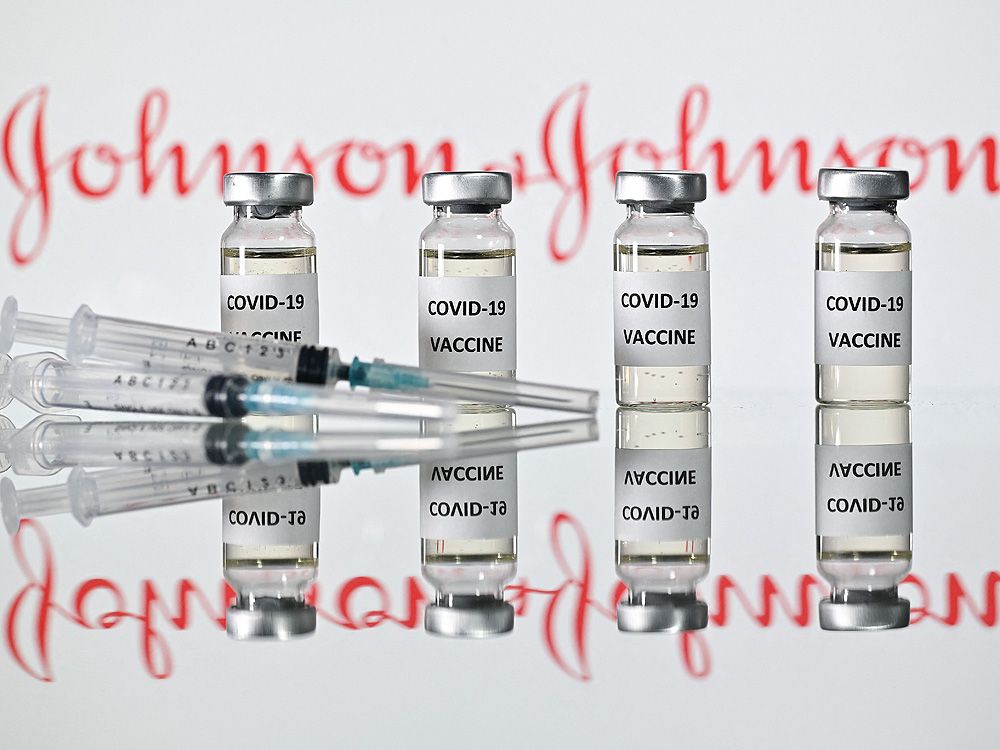
 torontosun.com
torontosun.com
Author of the article:Reuters
Reuters
Publishing date:Nov 24, 2021 • 18 hours ago • 1 minute read • Join the conversation
Vials with COVID-19 vaccine stickers attached and syringes with the logo of U.S. pharmaceutical company Johnson & Johnson.
Vials with COVID-19 vaccine stickers attached and syringes with the logo of U.S. pharmaceutical company Johnson & Johnson. PHOTO BY JUSTIN TALLIS /AFP via Getty Images
Article content
Johnson & Johnson said on Wednesday Canada gave full approval to its single-shot COVID-19 vaccine for people aged 18 years and older, making it the first full approval for the vaccine globally.
The vaccine was previously authorized by the country under an interim order.
Canada, which is reporting 2,563 infections on average each day and has administered at least 60,101,058 doses of COVID-19 vaccines so far, gave full approval to Moderna and Pfizer’s coronavirus vaccines in September.
The country authorized the use of Pfizer’s COVID-19 vaccine for children aged 5 to 11 and a booster dose for people aged 18 years and older this month.
J&J’s coronavirus vaccine has been authorized for emergency use in many countries, including the United States.

Canada gives full approval to Johnson and Johnson's single-shot COVID-19 vaccine
Johnson & Johnson said on Wednesday Canada gave full approval to its single-shot COVID-19 vaccine for people aged 18 years and older, making it the first full appro…
British scientists warn of 'horrific' new COVID-19 variant; only 10 cases so far
Author of the article ostmedia News
ostmedia News
Publishing date:Nov 24, 2021 • 10 hours ago • 1 minute read • 9 Comments
Graph Coronavirus Cells 3D Illustration
Article content
British experts are warning the world about a “horrific” new COVID-19 variant from Botswana that is being called the most mutated version of the virus yet.
Advertisement
STORY CONTINUES BELOW
Article content
According to a Daily Mail report , so far there have only been 10 cases of the strain, which could eventually be called ‘Nu’ — three in Botswana, six in South Africa and one case in Hong Kong — but it carries 32 mutations, suggesting it is highly transmissible and vaccine-resistant.
Professor Francois Balloux, a geneticist at University College London, said the strain likely came from a lingering infection in a patient with a compromised immune system, possibly someone with undiagnosed AIDS.
Dr. Tom Peacock, a virologist at Imperial College, who was the person to identify its spread, described the variant’s combination of mutations as “horrific.”
Peacock warned that B.1.1.529, its scientific name, had the potential to be “worse than nearly anything else about,” including the dominant Delta strain.
The good news is that scientists told the Mail its unprecedented number of mutations might make it “unstable,” and prevent it from becoming widespread.
They add there’s no need to be “overly concerned” because there were no signs yet that it was spreading rapidly but they are keeping an eye on it.
Balloux told the Mail it was likely the variant would be much more able to dodge antibodies than Delta.
“For the time being, it should be closely monitored. But there’s no need to be overly concerned unless it starts going up in frequency,” he said.

 torontosun.com
torontosun.com
Author of the article
Publishing date:Nov 24, 2021 • 10 hours ago • 1 minute read • 9 Comments
Graph Coronavirus Cells 3D Illustration
Article content
British experts are warning the world about a “horrific” new COVID-19 variant from Botswana that is being called the most mutated version of the virus yet.
Advertisement
STORY CONTINUES BELOW
Article content
According to a Daily Mail report , so far there have only been 10 cases of the strain, which could eventually be called ‘Nu’ — three in Botswana, six in South Africa and one case in Hong Kong — but it carries 32 mutations, suggesting it is highly transmissible and vaccine-resistant.
Professor Francois Balloux, a geneticist at University College London, said the strain likely came from a lingering infection in a patient with a compromised immune system, possibly someone with undiagnosed AIDS.
Dr. Tom Peacock, a virologist at Imperial College, who was the person to identify its spread, described the variant’s combination of mutations as “horrific.”
Peacock warned that B.1.1.529, its scientific name, had the potential to be “worse than nearly anything else about,” including the dominant Delta strain.
The good news is that scientists told the Mail its unprecedented number of mutations might make it “unstable,” and prevent it from becoming widespread.
They add there’s no need to be “overly concerned” because there were no signs yet that it was spreading rapidly but they are keeping an eye on it.
Balloux told the Mail it was likely the variant would be much more able to dodge antibodies than Delta.
“For the time being, it should be closely monitored. But there’s no need to be overly concerned unless it starts going up in frequency,” he said.

British scientists warn of 'horrific' new COVID-19 variant; only 10 cases so far
British experts are warning the world about a “horrific” new COVID-19 variant from Botswana.

